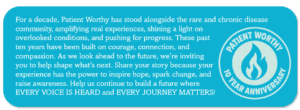Editor’s Note: Patient Worthy is honored to bring you this article originally authored by Shannon Cloud, Patient Advocacy Director of the Dravet Syndrome Foundation.
A few words spoken. Sharing an experience with a new friend. Playing a tambourine. Learning to fish.
These are a few of the small steps that families living with Dravet syndrome (DS) might celebrate. And for these families, these steps aren’t small at all, they’re powerful milestones that reflect resilience, persistence, and love. They mark progress in a journey that can often feel isolating, perhaps even uncertain.
DS is a rare epilepsy disorder that begins in infancy, causing frequent and prolonged seizures that are hard to control. In addition to seizures, it leads to developmental delays, cognitive challenges and motor difficulties. To learn more about DS, visit shineforwardwithdravet.com and dravetfoundation.org.
Being a caregiver to a loved one with DS means navigating a challenging journey–one marked by invisible struggles, complex responsibilities, and a profound emotional toll. Many caregivers describe a deep sense of isolation as they face this journey and search for activities their loved ones can not only participate in safely, but actually enjoy. Unfortunately, accessible recreational activities that meet the needs of those with DS are few and far between. As a result, many loved ones miss out on many of the simple joys of childhood, on activities they crave, experiences so many take for granted. Caregivers, of course, long for these moments for their loved ones too. Even more, they also seek connection and community for themselves, and their families. Siblings, too, seek a space where they feel seen, where their wants aren’t overshadowed by the demands of caregiving. Families affected by DS want to meet others who understand, who don’t question, who just get it.
This is why UCB partnered with the Dravet Syndrome Foundation (DSF) to create Camp Small Steps. Loved ones with DS have a strong desire to engage with the world, to explore, to play, to connect just like anyone would. But traditional recreational and camp experiences do not meet their unique needs. Camp Small Steps offers a beloved, camp-like experience tailored specifically for families affected by DS. As UCB US Head of Rare Syndromes, Jason Joseph, shares, “It’s more than just a camp—it’s an opportunity for families to celebrate their resilience, bond with each other, and create lasting memories in an environment that is safe, inclusive, and understanding. For over five years, UCB has supported communities living with developmental and epileptic encephalopathies (DEEs) like Dravet syndrome—reaching more than 10,000 patients globally—and remains dedicated to providing meaningful support to the DS and broader epilepsy communities every day. Camp Small Steps reinforces this commitment.”

Camp Small Steps is part of the DSF’s Day Of Dravet, a one-day workshop, followed by a day of fun at a nearby attraction, taking place across the country. At the DSF Day of Dravet, families participate in a variety of activities, like workshops and group sessions–each designed to support every member of the family. Loved ones with DS get to enjoy new, exciting experiences in a safe, joyful setting. Siblings can attend their own dedicated ‘Siblings Camp’, where they are reminded that this journey is theirs, too, and their voices matter. Caregivers get to connect with one another, exchange stories, share resources, and find strength in solidarity. It’s truly a rare, and crucial opportunity for learning, laughter, and community. It’s an event that recognizes the unique needs of the entire family.
So how did Camp Small Steps come to life? It was built with, and for, the DS community. From the very beginning, the program was shaped by listening, leveraging caregiver interviews, community surveys, and continued patient advocacy partner feedback.
- “I would love to have a safe and accessible camplike experience for my Dravet child and family.”
- “My Dravet son wants to do things with his brother. So, a camp for both kids would be great.”
These weren’t just statements. They were calls to action, helping us shape the vision and structure of Camp Small Steps. We learned that caregivers are desperate for supportive community-building, and inclusive, safe environments where their loved ones can experience the childhood memories that we often take for granted. The program is more than a camp–it’s an opportunity for families to celebrate their resilience, bond with each other, and create lasting memories in an environment that is safe, inclusive, and above all, understanding.
Every detail was designed with DS in mind. From the colors chosen for materials (bright colors that could trigger seizures were avoided) to the height of each station, the space was meticulously planned. Here is how the camp activities are organized:
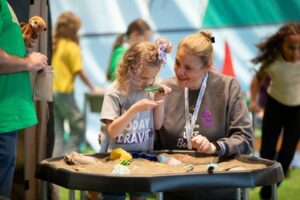
Lakeside Treasure Dig: Loved ones can explore different textures and sensations that encourage movement and enhance spatial awareness. They can scoop, mold, and sift through sand, searching for fossils, shells, and other treasures.
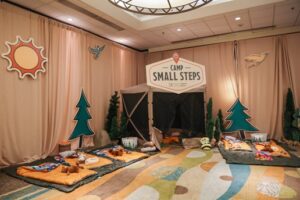
Calm Cove: The Calm Cove offers sensory relief to campers who prefer low stimulation, with sleeping bags, sensory toys, noise-canceling headphones, and books. Of course, neutral colors are prioritized for seizure safety.
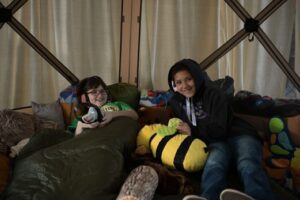
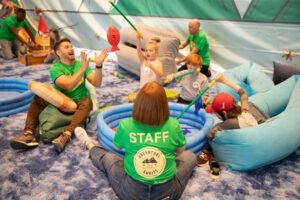
Gone Fishing: A fan favorite, this is a sensory play station where loved ones are given magnetic fishing poles to catch ‘fish’. Within this section, we also have inflatable canoes and sensory pod chairs. Overall, this offers sensory regulation, encourages fine motor skill development, and offers loved ones the chance to engage in a group activity.
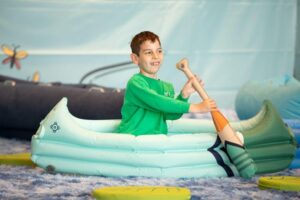
Photo Booth: It wouldn’t be camp without a picture to remember it by! Not only can families take pictures together, but they can even decorate their own frames.
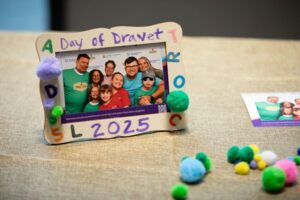
Campfire Jams: With a professional strumming the guitar, families sing along, and play along, around the safe ‘fire’. We offer musical instruments, each with different access points (as in, some are handheld, some tabletop, some on the floor, etc.) This offers sensory stimulation, celebration, and group fun.

At one point in the evening, we even lead a campfire sing along, where loved ones can play with toy microphones, hand drums, and more, as they sing and play along to familiar songs to enhance auditory processing, motor coordination, and social connection.
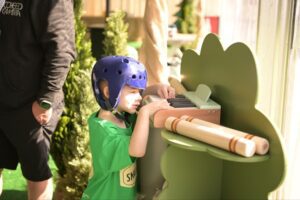
Arts & Crafts: With custom CSS stickers and CSS coloring sheets, campers of all ages can engage in tactile and visual input, plus fine motor skills, as they bring their ideas to life. This station is wheelchair accessible as well, and camp counselors are always nearby to support. There’s a variety of other crafts to choose from, with different textures, kinetic sand creations, and more.
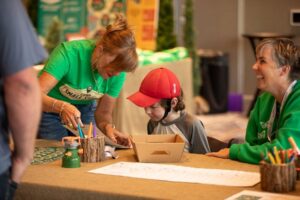
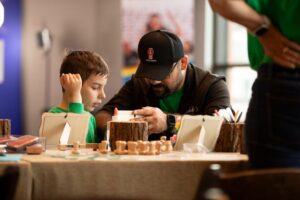
So far, Camp Small Steps has already gone to Texas, Tennessee, and Washington. And we look forward to heading to Illinois and Pennsylvania soon. Here are some things we heard from caregivers who’ve attended:
- “It was the most fun I think my Dravet son has ever had! Thank you for this experience!” –TN Caregiver
- “It had something for every age, all sensory levels. It felt safe and like a family event.” –TN Caregiver
- “It was amazing!!!! My kids all loved it and it was so accommodating for kids of all developmental needs! It will be talked about in our house for a long time!” –TX Caregiver
- “They’re not going to be able to stop talking about it. We could never send him [DS loved one] to camp.” –WA Caregiver
Camp Small Steps proves just how deeply caregivers cherish community, and how much loved ones deserve these experiences so many take for granted: singing, playing, and connecting. With inclusivity, safety, and joy at the heart of all we do, Camp Small Steps is a testament to what’s possible.
It’s been heartfelt to witness caregivers connect through shared understanding, to see loved ones play together, to watch as siblings find connection in one another. Camp Small Steps is a time to create new small steps together.
Because every small step is a step forward.
And each step forward is a triumph.

